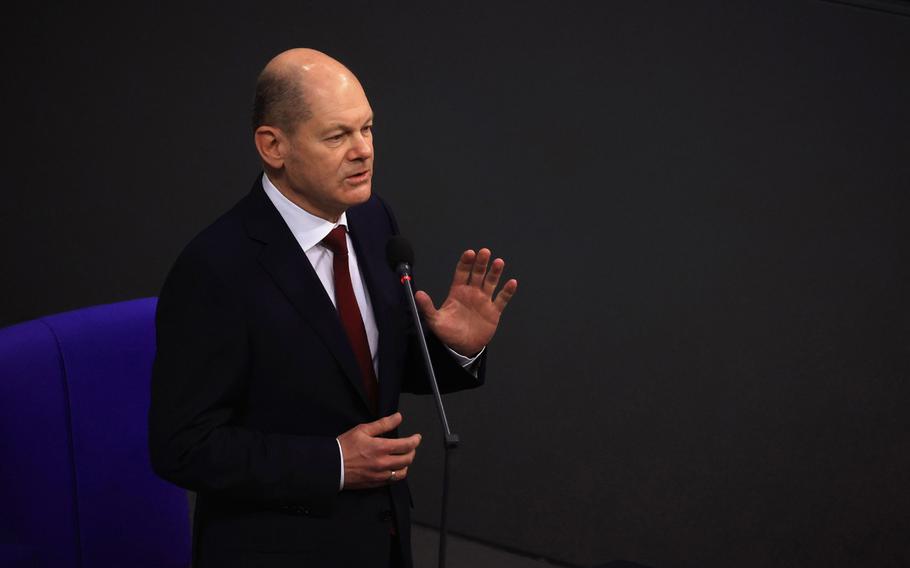
Olaf Scholz, Germany’s chancellor, speaks at the Bundestag in Berlin on Jan. 12, 2022. (Krisztian Bocsi/Bloomberg)
Olaf Scholz succeeded Angela Merkel as German chancellor nearly two months ago, but the West is still waiting for him to put his stamp on Europe's biggest economy.
Scholz is under increasing pressure to take a stand on Russia over its military buildup near Ukraine, as well as face up to domestic difficulties including a rampant coronavirus outbreak and criticism of his spending plans.
He has an opportunity to respond to critics when he embarks on his first trip to Washington as chancellor on Sunday. His meeting with President Joe Biden at the White House on Monday kicks off a period of more intense international activity.
The extent of Scholz's duress was made clear on Wednesday when the Sueddeutsche Zeitung newspaper wrote a headline, "Where is Scholz?" that questioned the chancellor's engagement with the tensions over Russia's troops massed near Ukraine. Moscow has repeatedly denied it plans to invade its neighbor.
That evening, he stumbled through an interview with national broadcaster ZDF. Pushed to respond to comments from former Chancellor Gerhard Schroeder — a Social Democrat like Scholz, who now works as a lobbyist for Russian industry — charging Ukraine with "saber-rattling," the soft-spoken 63-year-old said: "There's only one chancellor, and that's me."
What Scholz didn't do was lay out a clear plan for how to respond to the crisis. Instead, he repeated his usual talking points, namely that all options to impose retaliatory sanctions against Russia are on the table, but shipping weapons to help Ukraine defend itself are off.
"An invasion would carry a high price for Russia," Scholz told ARD television on Sunday before departing for Washington. In the interview he defended Germany's contribution to NATO and his own communication style. Calling his government the weak link in the military alliance's approach to Russia was a "false impression," Scholz said.
While following Merkel's 16-year run was never going to be easy, Scholz has given little indication of how he's going to seize the moment. Last week, he didn't take part in his party's debate on the SPD's policy toward Russia, and has made few moves to carve out a bigger presence on the international stage — in contrast to French President Emmanuel Macron's active diplomacy.
Scholz's sputtering start has hit his party's popularity. Support is down to 23% of German voters, falling below the Christian Democrat-led conservatives for the first time since before the September election.
The former finance minister pulled off a narrow victory with the promise of melding Merkel's steady approach to government with reforms to modernize Germany's economy. He's since put together a ruling alliance of his center-left SPD, the Greens, and the market-oriented Free Democrats, with little signs of tension despite various ideological differences.
Since then, though, the coalition has lacked a clear agenda. In the fight against the coronavirus, arguably the defining issue of the decade, the government warned of a lack of vaccines, and then tightened curbs on unvaccinated people. Cases driven by the omicron strain remain extremely high.
In another setback, Germany's public-spending watchdog called on the government to renounce plans to transfer 60 billion euros ($69 billion) from last year's budget to a fund to finance future climate projects, calling it incompatible with constitutional spending rules.
The initial excitement around Scholz's government is "visibly dissipating," said Manfred Guellner, head of the Forsa polling institute.
The Ukraine crisis is a critical test for Scholz. It touches on numerous aspects that complicate his position. Domestically, his party, which traditionally is in favor of engaging with Russia, is at odds about how aggressively it should challenge the Kremlin.
While historic guilt over World War II also plays a role in Germany's stance, energy security is a more immediate concern.
As Germany shuts off nuclear power plants and phases out coal, it's become more dependent on Russian gas to heat homes and to fuel power plants for industrial giants like BASF SE and Volkswagen AG. The fallout from a military conflict in Ukraine could put those supplies at risk.
Scholz's meeting with Biden will likely prove critical. The leaders were introduced by Merkel at the Group of 20 meeting in October, and the White House has been pushing for Germany to play a more active role in geopolitics.
While Scholz is unlikely to completely redirect Germany's foreign-policy approach, he could adopt a stronger, or at least clearer, stance. If not, the risk is that rivals fill the void.
The White House, meanwhile, is stressing that there's no daylight between its views and the German government's and that the two leaders are aligned in their efforts to deter Russia as well as on promoting a diplomatic path to resolve the crisis.
In the event of Russian aggression, there's absolute agreement on next steps, including on additional troops that would have to be deployed to the eastern flank and the imposition of a large economic sanctions package, according to a senior administration official.
In a recent Bundestag debate, Friedrich Merz, the former Merkel antagonist elected in January as the new leader of the CDU, said Germany was currently seen as "woolly and unreliable" — a state of affairs he blamed on Scholz.
Scholz's Washington visit kicks off a series of meetings that could give him a more sustained presence in global affairs. After returning to Berlin, he'll meet the leaders of the former Soviet republics of Estonia, Latvia and Lithuania, as well as European Council President Charles Michel.
The push culminates the following week, when Scholz is due to travel to Kyiv on Feb. 14. He heads to Moscow for talks with President Vladimir Putin a day later.
Ukraine will be hoping for more than 5,000 protective helmets and a field hospital from the European powerhouse. Andrij Melnyk, the country's German ambassador, accused Scholz's administration in a Twitter post of keeping its head in the sand.
"This ostrich-like policy needs to be stopped," he said.